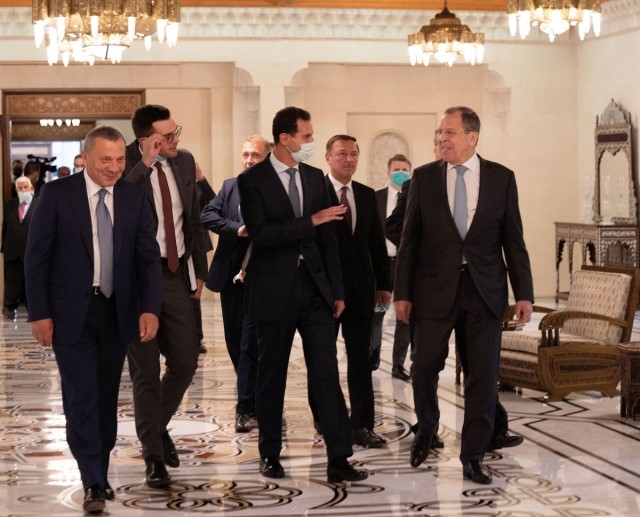BY: Stanislav Tarasov*
Translated BY: Daniel Ranjbar

PEJOURNAL -The so-called new approach to the Syrian settlement outside the brackets envisages the implementation of the aspirations of Moscow and Tehran to establish contacts between Ankara and Damascus which would confuse the cards for many regional and external players.
Russian Foreign Minister Sergei Lavrov paid a visit to Damascus, where he was met with Syrian President Bashar al-Assad and held talks with his Syrian counterpart Walid Muallem. The day before, Russian Deputy Prime Minister Yuri Borisov also arrived in the Syrian capital.
Lavrov’s trip from the point of view of the Arab publications “is dedicated to the fight against terrorism and the discussion with the Syrian leadership of the results of the work of the Constitutional Committee, the next round of meetings of which took place at the end of August”
In addition, the issue of Idlib and northeastern Syria was announced. As for Borisov’s negotiating agenda, according to the Syrian news agency SANA, “the Russian delegation will hold negotiations within the framework of the Syrian-Russian intergovernmental commission on trade, economic, technical and scientific cooperation, the previous meeting of which was held in December 2019 in Moscow.”
To begin with, an element of intrigue was introduced by Ukrainian Foreign Minister Dmitry Kuleba, who said on the air of the ICTV channel that he had turned to the Russian Foreign Ministry with a request to speak with Lavrov about the escalation of the conflict in Donbass. However, the Ukrainian side allegedly received a message that “the minister has urgently left for a business trip, and it is not known when this conversation will take place.”
Whether Lavrov’s trip to Syria was really ‘urgent’ is difficult to say. But the fact that it had some important features is a fact.
It seems strange that the last time the head of the Russian diplomatic department visited Damascus was in February 2012. Then he was accompanied by Mikhail Fradkov, who headed the Foreign Intelligence Service at that time. Now, in fact, Deputy Prime Minister Borisov has played this role.
Therefore, when some Russian government commentators classify Lavrov’s current visit to Damascus as ‘historical,’ there is a desire to understand: why?
Last week, Russian diplomats and the military discussed the situation in Syria with a Turkish delegation that came to Moscow. In addition, Lavrov met with representatives of the Council for Democratic Syria and other representatives of the northeast, which caused increased political irritation from the Turkish side.
The Russian Foreign Minister also held talks with the UN Secretary General’s special envoy for Syria Geir Pedersen. Apparently, it was in this format that the decision appeared, which Lavrov brought to the trip of Damascus.
Most likely, we are talking about a change in the position of a part of the Syrian Kurds regarding the fact that a large American oil company received the right to extract oil in northeastern Syria. This part of the country is controlled by the Kurds, who not long ago declared that they did not recognize official Damascus and were guided by the United States.
And in the broadest sense of the word, after the Egyptian-Jordanian-Iraqi summit held at the end of August, when it was announced that an agreement had been reached “jointly oppose the attempts of other states to undermine the security of the Arab world and the importance of a political solution to the conflicts in Yemen, Libya and Syria,” it became obvious that the situation is changing.
According to Egyptian expert Hassan Abu Taleb, this tripartite alliance perceives Turkey as a state that “violates the principles of good neighborliness – whether because of natural resources, as in Libya and the Eastern Mediterranean, or because of the desire for control, as in the north of Syria and Iraq” According to him, “the alliance is designed to thwart Turkish plans and intends to enter into cooperation with Damascus.” That is why, according to the Arab news outlet Al-Arab, in certain circles in Damascus “they were wary of Lavrov’s visit, believing that he would bring certain ready-made solutions.”
It is difficult to speak about decisions due to the lack of relevant information. And the judgments were expressed by Lavrov at a press conference in Damascus. They boil down to the following, in our opinion, the main positions:
Syria has withstood the fight against international terrorism and the forces that harbored the project of destroying the Syrian statehood.
The hotbeds of terrorists still remaining on Syrian territory are being liquidated and will be completely destroyed. There is a commitment to the Astana Process on the Idlib issue.
Lavrov expressed confidence that all agreements with Turkey on the de-escalation zone in Syrian Idlib will be implemented. He recalled that there are extremely clear, concrete agreements, the distribution of responsibilities, providing for the delimitation of the normal, sane opposition and terrorists, the release of the M-4 highway, and the creation of a security corridor around this highway. According to him:
“All this is being carried out at least slowly but surely, and there is every reason to believe that we will bring this work to the end.”
And according to Borisov, the parties want to extend the success that has been achieved over the years in the military-political field to the restoration of the Syrian economy, which means the transition of the settlement in Syria from a military to a political track.
Moreover, by all indications, the overlooked solution to the Kurdish issue in Syria may suit Turkey. If all this can be implemented, then Lavrov’s visit to Syria can really become a historic one.
*Stanislav Tarasov is Chief Editor of the Eastern Edition